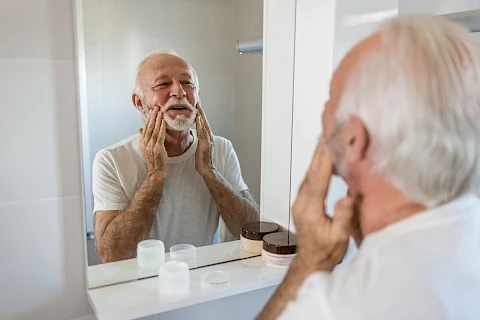
November is National Healthy Skin Month, making it the perfect time to focus on skin care—especially for seniors. As we age, our skin undergoes several changes that can impact its health. Maintaining healthy skin is essential not just for appearance but also for overall comfort and well-being.
Changes in Aging Skin
Aging brings about several changes to our skin. It may become thinner, drier, or less elastic than it once was. Some people notice more wrinkles, age spots, or bruising. In addition, seniors have a greater risk of suffering from dryness, itching, and increased sensitivity. Therefore, it's important to adapt skincare routines to meet these new challenges. Understanding how aging affects skin helps in taking the right steps to care for it.
Essential Skin Care Tips
Fortunately, there are several things seniors can do to better care for their skin.
Stay Hydrated
Hydration is key for keeping skin healthy and supple. As we age, skin tends to lose moisture more easily, making it crucial to stay well-hydrated. Regularly drinking water and eating plenty of water-filled fruits and vegetables makes it easier to maintain that healthy glow.
Use Gentle Products
Switching to gentle skincare products can preserve your skin's health as you age. Fragrance-free creams and soaps with natural ingredients are less likely to irritate sensitive skin. Consider opting for mild, fragrance-free cleansers, cream-based moisturizers, and products with added hydration like hyaluronic acid. Choosing the right products helps protect the skin's natural barrier without causing additional dryness or irritation.
Protect Skin from the Sun
Even during November, sun protection is vital. The sun's UV rays can penetrate clouds and cause damage, leading to wrinkles and age spots. Effective sun protection includes wearing broad-spectrum sunscreen with an SPF of 30 or higher and opting for protective clothing when outdoors, such as hats and long sleeves. By protecting your skin from sun exposure, you can help prevent further damage.
Addressing Common Skin Concerns
If you have serious skin issues, always consult your doctor. However, there are several strategies you can try at home to manage minor skin irritation.
Dryness and Itching
Dry, itchy skin is a common concern for seniors. This can happen due to decreased oil production and exposure to dry air. To manage dryness, use a humidifier at home, moisturize immediately after bathing, and choose lukewarm rather than hot showers. These small changes can alleviate discomfort and improve skin texture.
Bruising and Thinning Skin
As skin becomes thinner with age, it can bruise more easily. Understanding this fragility can help in taking protective steps. Wear soft clothing to minimize friction and use cushioning around the home to reduce impacts. These precautions can help manage and protect delicate skin.
Age Spots and Wrinkles
Age spots and wrinkles are common signs of aging. While they are natural, you might wish to minimize their appearance. Use creams with retinoids, which can promote a smoother texture, and consider products with vitamin C to help even skin tone. These simple strategies can help your skin look its best.
Consult a Dermatologist
Regular check-ups with a dermatologist are essential for maintaining skin health. A professional can offer personalized advice tailored to your unique needs. Consider visiting a dermatologist for annual skin health evaluations and discussion of concerns like persistent dryness or unusual marks. Don't hesitate to seek expert guidance to keep your skin in peak condition.
Your Skin Deserves Attention
By staying hydrated, choosing gentle products, and protecting yourself from the sun, you can maintain healthier skin this November and beyond. We encourage you to adopt these tips into your daily routine.
Do you need more help at home, including assistance with skincare routines? For personalized senior care services, contact Senior Helpers Elmira-Ithaca. We're here to support seniors in Elmira, Ithaca, Corning, Bath, and Watkins Glen with all their care needs.